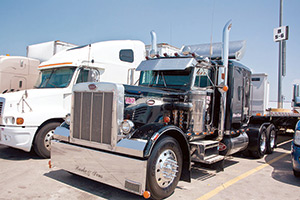Senior Reporter
Parking Woes Hurt Efficiency, ATRI’s Driver Survey Finds

This story appears in the Dec. 19 & 26 print edition of Transport Topics.
Spending nearly an hour looking for a place to park a truck cuts into a commercial driver’s productivity and wages, a new study by the American Transportation Research Institute found.
On average, drivers surveyed noted that 56 minutes were spent looking for parking during work hours. For truckers, this means a reduction of 9,300 revenue-earning miles a year — equal to $4,600 in less wages, according to the study published Dec. 13.
The report was released a day after the National Coalition on Truck Parking met at U.S. Department of Transportation headquarters to establish task forces, and the Federal Motor Carrier Safety Administration said it’s planning a report on options for improving truck parking.
ATRI said it relied on 148 diaries kept by truckers, chronicling a 14-day period this year. The diaries were returned to ATRI between June and September.
In them, truckers indicated myriad challenges when it came to searching for available parking between 4 p.m. and midnight. Overall parking on weekdays was tougher than on weekends.
“The effects of truck parking shortages are further demonstrated through the remaining drive time, search time and unauthorized, undesignated truck parking observed in the truck parking diaries,” according to the study.
A driver quoted in the study told ATRI: “Parking is a huge problem. I start early and end my day early to help my chances of finding a parking space. The routes I travel are mostly out West, and parking is not as hard to find, with the exception of urban areas. I have found that east of the Mississippi River, you need to be parked way before you are out of drive time, or you won’t find a legal place to park.”
ATRI noted states’ departments of Transportation, transportation groups and the industry have launched online tools in recent years aimed at assisting truckers find parking.
The National Coalition on Truck Parking task forces would research parking capacity, technology opportunities, funding and regulatory concerns, and state and local partnerships. The coalition also examined the role of public-private partnerships, regional freight plans and vehicle-to-vehicle technology as ways to expand parking facilities.
“The National Coalition on Truck Parking has gotten off to a good start,” Katelyn Dwyer, program manager for freight at the American Association of State Highway and Transportation Officials who attended the Dec. 12 meeting, told Transport Topics. “[Federal Highway Administration], AASHTO and the other coalition partners have identified several key initiatives to work on in the coming months to improve safety and increase the number of available parking spaces for the drivers we depend on to move America’s freight.”
Darrin Roth, vice president for highway policy for American Trucking Associations, was also at the meeting and he told Transport Topics on Dec. 14 ATA’s focus is to increase capacity where it’s needed.
“There are various strategies to do that. The most obvious is a federal flow of money to increase capacity. Then we have to look at all the barriers to capacity expansion, including at the local level, such as zoning regulations that prevent truck stops from expanding or opening new facilities,” Roth said.
DOT created the National Coalition on Truck Parking last year, prompted by the results of a congressionally mandated survey conducted by FHWA’s Office of Freight Management and Operations that found most states report problems with truck parking shortages.
The national parking shortage ranks fourth on ATRI’s 2016 top 10 issues before the industry.

